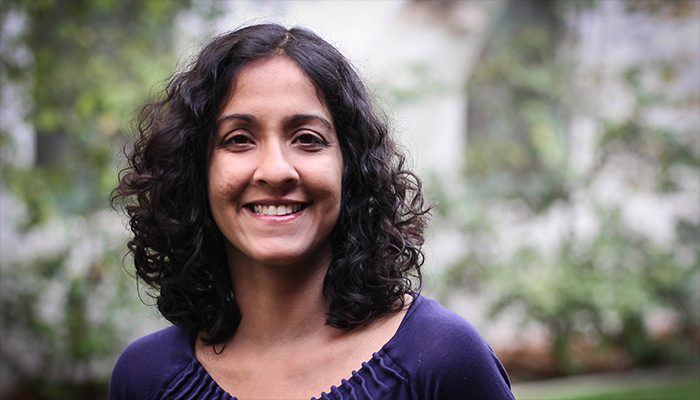
“The move I made this summer beats my move to college twenty years ago by a few hundred kilometers,” says Sumita Pahwa of her recent transition to Scripps College. Given that her original trip was from Calcutta, India to Vermont, that’s saying quite a lot.
Pahwa, Scripps’ new member of the politics and international relations department, joins the College by way of Cairo, where she lived with her husband and four-year-old for nearly three years researching the Muslim Brotherhood. The shifting political realities of the region made it difficult to stay, so the family relocated this past summer to Claremont, where Pahwa is eager to familiarize herself with the community.
“It was a fascinating time to be there,” she says of her time in Egypt. “Politically turbulent and eventful, with more elections, new parties, and protest movements than there had been for decades, which is great for a researcher. The oppression came during our last six months there; people started to be prosecuted for so much as interviewing Islamists, and researchers and journalists suddenly had to be cautious about openly criticizing the army. One was used to the old police state under Mubarak, which was predictable in whom it went after, but the new repression of the past year has cast a wider and more unpredictable net.”
Pahwa’s situation intensified when her research materials on the Brotherhood were in danger of becoming banned literature. To get it out of the country, she scanned her research at a friend’s office and stopped talking about her work in public. “Most of the members I had interviewed were now in jail and those who were not denied they were part of the organization,” she says.
Most of her possessions are still slowly making their way across the Atlantic to the Port of Los Angeles. “There were some trade-offs between Legos and academic books in the limited space we had,” says Pahwa. “It took a few weeks to pack everything up, but we flew from Cairo with our cats and our suitcases.”
Pahwa’s interest in government stems from her upbringing around the political turbulence in 1980s India, where secessionist and religious movements brought their conversations to the public on a regular basis. She studied the rise of Islam and Middle East politics in college, but the electoral success of a Hindu nationalist part in Indian elections motivated her to investigate further. “India is a country that had long prided itself on secularism and tolerance,” she says, “and that really challenged my notions about rationality and progressivism in democratic politics.”
Now in the United States, Pahwa looks forward to working with students and guiding senior research projects. “The students I’ve met thus far seem to be a really intellectually curious, self-confident, motivated bunch,” she says. “I’ve never taught at a women’s college before and I’m curious to see what classroom dynamics are like with a different gender balance.”
Still, Cairo will never be far from her heart. “The biggest challenge,” she says, “will be getting used to following politics in the Middle East from a distance.”

